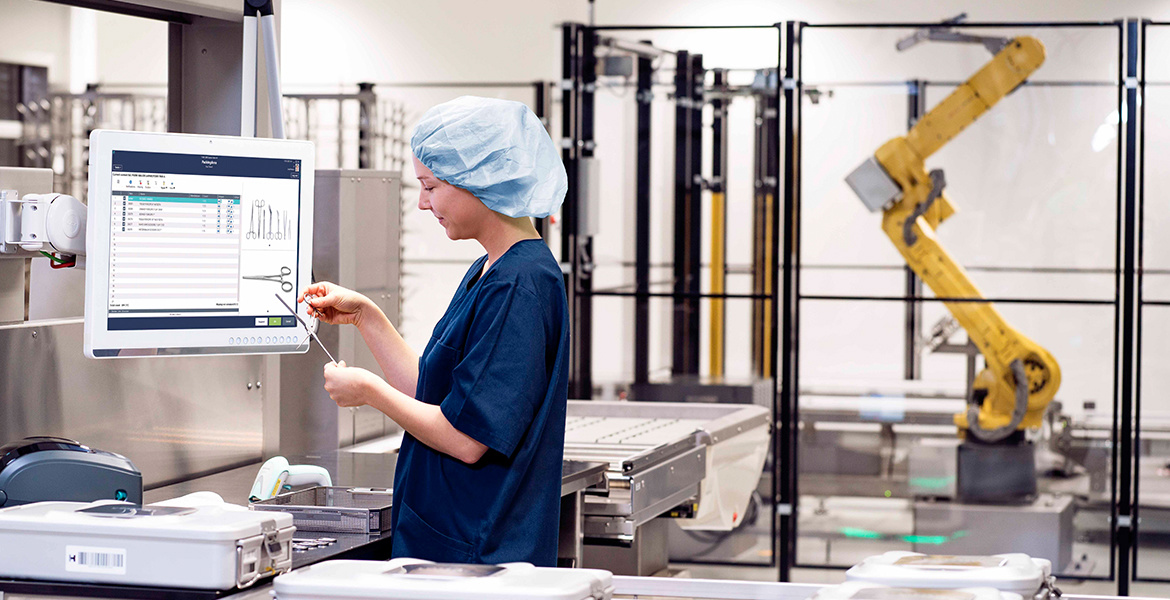Revolutionizing the sterile supply workflow
The Capital Region of Denmark, home to over two million residents, has merged seven Central Sterile Service Departments (CSSDs) into a unified regional CSSD. It is powered by T-DOC intelligence to manage the entire flow: From logistics and warehousing to interfacing with multiple hospital IT systems and driving automation in the CSSD. A transformation that is setting new standards in efficiency, quality, and staff satisfaction.
A unified vision for modern CSSDs
Faced with serving 33 surgical departments across seven hospitals, the region needed a solution for uniform traceability and workflow management. The requirement was a documentation and surgical instrument traceability system that could ensure a coherent flow in the CSSD, out to the operating rooms, and then back again.
T-DOC stood out for its technical capabilities, user-friendly design, and adaptability. Program Manager Trine Frederiksen explains “It was important that the hospitals could provide input to help develop and customize it in steps with their future needs.”
Combining T-DOC with automation is made easy with the user-friendly
T-DOC interface. The automation intelligence allows the sterile assistants to focus on higher-value tasks such as precise tray assembly, conducting quality assurance and ensuring continuity in the production.
Automation intelligence transforming the CSSD
The regional CSSD spans two state-of-the-art facilities, each capable of maintaining operations independently to ensure uninterrupted service. The facilities utilize advanced automation to enhance efficiency while reducing the manual workload, all driven by T-DOC intelligence. The system even optimizes ergonomics, instructing robots to position heavy trays at the most accessible heights.
T-DOC’s automation capabilities not only improve working conditions but also guarantee consistent quality. Repetitive tasks like lifting, pushing, and pulling are now managed by robotic systems, significantly reducing strain injuries among staff. “You can really say T-DOC has helped improve the working environment,” Frederiksen noted.
Simplifying processes through seamless integration
One of T-DOC’s standout features is its ability to integrate seamlessly with existing hospital systems, including surgical scheduling, material management, and logistics solutions. “The advantage of using interfacing with T-DOC is the simplicity; the employee only has one screen and structure to deal with,” said Frederiksen.
This integration offers live updates, enabling staff to track instrument usage and availability in real time. By eliminating the need to enter the same data into multiple systems, it reduces double work and improves data quality. The ability to monitor production and anticipate when trays will return to the CSSD helps streamline workflows and prevents bottlenecks. The system’s interface also simplifies training and ensures a smoother onboarding process for new employees.
T-DOC helps us a lot with case cart deliveries. Once we’ve made the case cart compositions, we can add special preferences for the individual surgeon or surgical procedures.
Meeting surgical demands with custom case carts
Efficiency extends to the operating room through T-DOC’s dynamic case cart functionality. Each cart is customized to specific surgical needs, incorporating instruments and materials tailored to individual surgeries or even specific surgeon preferences.
Operating room staff can scan barcodes to instantly register cart contents, saving time and reducing manual handling. This precision not only minimizes errors but also reduces the need for on-site storage, freeing valuable space within the surgical department.
The installation includes a wide range of T-DOC functionalities:
The installation includes a wide range of T-DOC functionalities:
Empowering staff, enhancing patient care
The transformation at the Regional CSSD in Capital Region is a testament to how innovative solutions like T-DOC can impact the sterile supply workflow. By automating repetitive tasks and optimizing workflows, it has not only enhanced efficiency but also created a healthier, more ergonomic work environment for staff. This seamless integration of technology and care underscores the power of smart systems to drive quality, consistency, and positive outcomes, not only for staff but also for patients.

The Capital Region's Hospitals in numbers
Two CSSDs serving seven hospitals
+470 T-DOC production workstations
+150 T-DOC admin workstations
33 surgical departments
+300 operating rooms
200,000 surgical procedures/year
416,000 reprocessed containers/year
1,340,000 reprocessed trays/year
